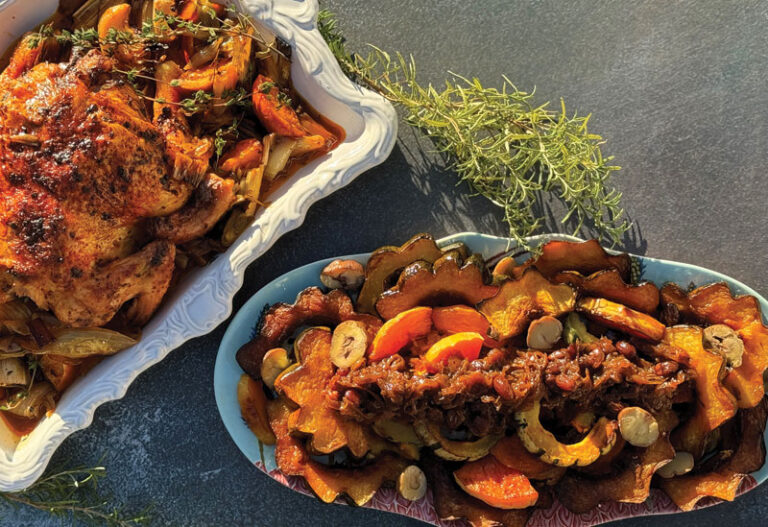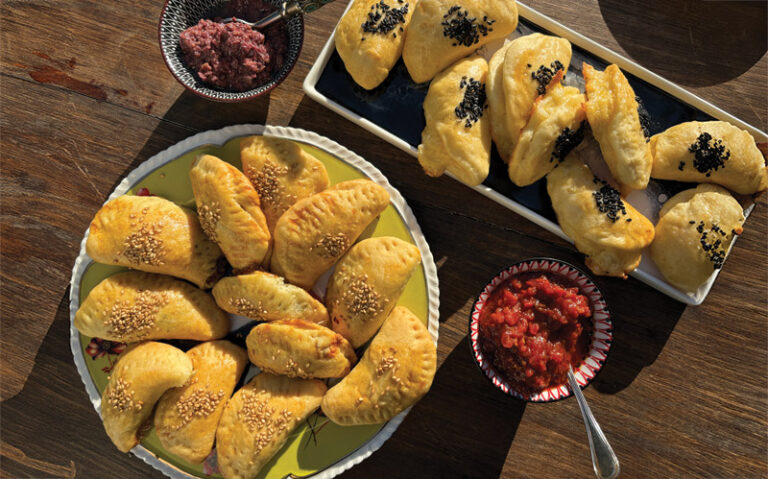Of Peace and Pasta
It is especially customary to eat letrea as part of the meal before the fast of Yom Kippur.

As a mother of three I have boiled hundreds of pots of pasta. Spaghetti with meatballs, rigatoni with olive oil, macaroni and cheese with a crispy topping, packaged Wacky Mac, spirals with butter, bowties with marinara sauce. The list is endless. Pasta is always an easy go-to dish for busy days and nights, a comfort food which is sure to please the whole family.
As a child growing up in a Moroccan kitchen, I have a very different memory of pasta as “comfort food.”
But as a child growing up in a Moroccan kitchen, I have a very different memory of pasta as “comfort food.” My memories are of my mother making dough and feeding it through a pasta machine clamped to the kitchen table. She would crank the handle round and round and thin noodles would shoot out. She would spread the noodles all over the counters so that they could dry out. Noodles, noodles everywhere.
Meanwhile, in a large pot on the stove, a chicken was boiling in a broth flavored with saffron and onion, the delicious aroma filling the air.
This is one of my only truly vivid memories from my childhood in Morrocco. Often I think I remember something but it’s only because I have seen a photo. I have carried this memory with me all these years. If you are Spanish Moroccan, like my family, you call this noodle dish letrea. If you are French Moroccan you call it lintriya. Whatever you call it, this dish of thin fresh egg noodles cooked in a chicken broth with saffron is perfectly savory and satisfying.
Letrea is a special side dish (not a soup) eaten on holidays. It is especially customary to eat letrea as part of the meal before the fast of Yom Kippur. It is typically served with the chicken that is used to make the broth or with roast chicken.
In America, my mother started using the store bought thin egg noodles for convenience. But she always patiently boiled a homemade chicken broth. I’m a little ashamed to admit that occasionally, when pinched for time, I have taken convenience to the next level by using store bought chicken broth or chicken consommé powder. I just add turmeric and saffron to give it that special home made flavor. But there’s nothing better than a homemade chicken broth.
Letrea is one of the dishes that my mother made that is fondly remembered by my children and my nieces and nephews. Whenever I prepare Letrea, everyone is very excited. Of course I could never replicate the perfection of my mother’s noodles. She would go as far as to steam the noodles in a couscousier (a double boiler used for couscous). She would add the chicken broth one ladle at a time to make sure there would be just the right amount of liquid and that the noodles wouldn’t be too dry or too sticky.
Over the years I have had a few fails and have tossed away some pots of noodles. So it is important to take your time and not rush through the steps. This noodle dish is satisfying and easy on the stomach. Just perfect for an easy, comfortable fast.
—Rachel
A couple of weeks ago, my daughter Alexandra called me from the Golan Heights. She and the other girls in her B’nei Akiva Seminary were on a tiyul (trip) in the North.
“Mommy, they told us such a sad story about an officer called Yoav in the Yom Kippur War. He was the commander of a unit stuck in a bunker under fire from Syrian forces. He and another soldier decide to go out of the bunker to deflect the Syrians and try to save their fellow soldiers.
Yoav is killed immediately but the Syrians don’t know that they’ve killed him. The Syrians are focused on finding an Israeli pilot that they have seen parachuting from his fighter jet. The other soldier approaches the Syrians and holds up a finger, indicating that he is alone. As a tankist, he is wearing a jumpsuit, similar to the one that Israeli pilots wear. The Syrians think that they’ve captured the pilot and they take him to Damascus where he is held as a prisoner of war.” She continues. “A few years pass by, he marries and he has a son.”
“Mommy!” She exclaims. “Yoav’s father is the Sandak (G-dfather) at the Brit Milah. And he names his son Yoav!”
I cry silent tears for the sadness of loss and the love and compassion that this soldier has for Yoav and his family. He has not forgotten Yoav’s heroism. He has not forgotten Yoav’s sacrifice for his brothers in arms.
It is hard to believe that it has been 50 years since the Yom Kippur War. I remember it like yesterday. Waking up in the middle of the night to see my mother and father and my Uncle Naim and Aunt Dahlia sitting on the balcony watching trucks loaded with tanks roaring past on the main road. They know that the Israel Defense Force is sending reinforcements to the North and that war is imminent.
The next day, I watch as my uncle Naim and uncle Eliyahu break their fast with sandwiches slathered with butter and strawberry jam. My brother Rafi and my cousins and I follow my father’s brothers down the stairs of the apartment building. Silently, with heavy backpacks slung over their shoulders, they head out through the orange trees in the pardes (orchard) that grows behind their home. I remember thinking how brave they are, setting out to fight in the war.
I remember the grey haired men who wear bright orange vests and sit guard at every street corner, doing their part to keep the home front safe. I remember that outside every supermarket is a massive metal container to collect soap and deodorant, razors and shaving cream, toothpaste and toothbrushes for the soldiers at the battlefront. I remember being so proud when my father buys some toiletries to add to the pile.
I remember the high-pitched wail of the air raid sirens and running to the dusty miklat (bomb shelter) at the home of my Uncle Shlomo and Aunt Shoshana. My cousins Rafi and Ronit are the same ages as my brother and I and we relish the novelty of eating Marie biscuits and Bissli underground.
Another night we are visiting at the home of my great aunt Rachelle. My brother has fallen asleep and he won’t wake up when the air raid siren sounds it’s warning. In his anxiety to reach the safety of the bomb shelter, my father lifts my brother too high and Rafi’s head hits the chandelier, causing blood to gush, a minor casualty in this horrible war.
I remember hearing the song “Lu Yehi” on the radio. This anthem of the war can still bring me to tears. With much gusto, my cousins and I sing “He’veinu Shalom Aleichem,” this song that represents a yearning for peace. I remember wondering as a little girl if the Arabs share the same longing for peace.
I know going into this Yom Kippur that the nature of the battle has changed. The next generation of brave young men and women still don the uniforms of the IDF in order to defend all the citizens of Israel, Jew, Muslim, Christian, Druze, black, white, brown and yellow. My son Ariel served in the IDF and my cousin’s children have served and still serve. But the Jewish people cling to hope. Before the fast, my family will eat sweet fresh yellow dates and honey cake. We will pray that our friends and family are sealed for a year of health and happiness and that peace will prevail in Israel and the entire world.
—Sharon
Letrea Recipe
1 cup boiling water infused with a generous pinch of saffron (set aside)
1/3 cup avocado or vegetable oil
1 3-lb whole chicken, with skin
1 onion, chopped
1 tsp turmeric
2 tsp consommé powder
1 tsp white pepper
Kosher salt, to taste
2 Tbsp oil
1 lb bag of thin durum semolina egg noodles
In a soup pot, warm 1/3 cup of oil over medium heat.
Add the chicken, onion, turmeric, consommé and white pepper. Sear each side of the chicken for a few minutes.
Add the saffron water and add enough boiling water to submerge the chicken.
Cover the pot, lower heat and simmer for one hour. Taste the broth and add salt if necessary.
In a large pan, warm the remaining two tablespoons of oil over medium heat.
Add the entire bag of noodles and sauté until they start to lightly golden.
Lower the heat and slowly add one ladle of broth. Allow the noodles to absorb the broth, then slowly add the second and third cup of broth.
Add more broth if the noodles look too dry.
Use a fork to separate the noodles, cover the pot and reduce heat completely.
Allow the noodles to rest for 10 minutes, separate again. Then transfer to a large bowl.
Notes:
Bechtle is my favorite brand of egg noodles. Noodles can be reheated in the microwave.
Rachel Sheff and Sharon Gomperts have been friends since high school. They love cooking and sharing recipes. They have collaborated on Sephardic Educational Center projects and community cooking classes. Follow them on Instagram @sephardicspicegirls and on Facebook at Sephardic Spice SEC Food.







